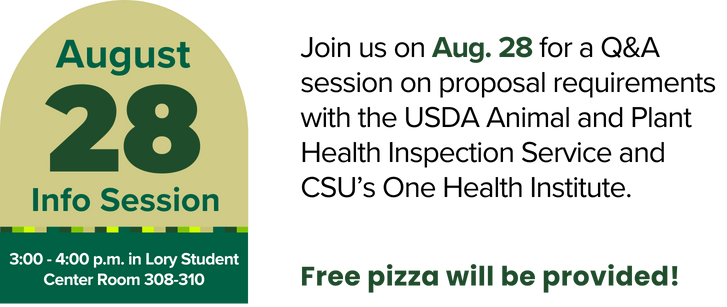
One Health Institute's Mini-Grant Challenge
Emerging Disease Threats with Implications for African Swine Fever
Download the full PDF with application requirements and submission guidelines here.

We are excited to launch the One Health Institute’s (OHI) Mini-Grant Challenge in collaboration with the USDA-Animal and Plant Health Inspection Services Department of Veterinary Services. OHI is seeking One Health solution-oriented approaches to emerging disease threats that also demonstrate clear potential to inform preparedness and response for African Swine Fever (ASF).
ASF is a viral disease that is not a direct threat to human health, but spreads quickly and kills most wild and domestic pigs who get the disease. Currently, there is no treatment or vaccine for ASF, so the best protection is prevention. African Swine Fever has never been found in the United States, but it has recently been found in the Caribbean countries of Haiti and the Dominican Republic. The nearby ASF threat has increased the urgency to keep African Swine Fever out of the United States and be prepared if the viral disease is detected in the U.S.
The One Health Institute is seeking proposals from students in a wide range of disciplines including, but not limited to, animal health, wildlife biology, microbiology, computer science, engineering, the social sciences, natural resource management, art, communications and business who have innovative ideas and approaches that can inform solutions to ASF challenges.
Funding: $10,000 per award, up to nine awards for a total of $90,000
Duration of Funding: October 30, 2024 - September 30, 2025
Eligibility
The opportunity is open to students at Colorado State University (non-funded collaborators welcome). Undergraduate, graduate, professional, and postdoctoral students are encouraged to apply.
Student teams will be considered if they are multidisciplinary (team members are from different disciplines). Selected students will work with a university mentor (usually related to the student’s current or past university work and who is involved in the proposal submission).
Focus Areas:
- OPEN: Up to five awarded mini-grants (up to $10,000 per award for a total of $50,000) will apply innovative methods and analysis that can inform real-world ASF challenges. Projects may be related a student’s own work at the university.
- EXTREME WEATHER: Up to four awarded mini-grants (up to $10,000 per award for a total of $40,000) will focus on understanding extreme weather impacts on viral disease risk. Students will apply scientific methods and analysis to either: 1) Work from available datasets (provided by USDA and/or the mini-grant awardee) to identify rural communities at high risk for viral disease and will inform on incursion of ASF (e.g. non-commercial farms with pigs near wild pig habitat) and how those areas may overlap with extreme weather hotspots, 2) Develop a weather vulnerability index for non-commercial farms in rural communities, or 3) Design and test weather-ready response for viral disease that will inform on ASF response and preparedness strategies such as pre-event scenario planning, table-top exercises, or rapid prototyping. Projects may be related to the student’s own current and/or past work at the university.
Proposal Requirements:
- Title Page and Abstract: Include applicant details, faculty advisor information, project title, and a half-page abstract.
- Background Information: Outline the problem, its community impact, and project scope (one page).
- Hypotheses and Project Aims: Clearly state your research hypotheses and aims (half page).
- Research Plan: Describe your approach, objectives, and anticipated findings (three pages).
- Preparedness and Response for ASF: Explain how your project will contribute to ASF preparedness and response (one page).
- Proposed Budget: Provide a detailed budget and justification (one page).
- Appendices: Include references, timeline, team description, faculty advisor support letter, and other relevant documents.
Reporting Requirements:
Written final report, quarterly check-in, final oral presentation of results
Publications:
Recipients of any grant from the OHI are strongly encouraged to publish their findings in a peer-reviewed journal. All such publications must acknowledge funding provided by the Colorado State University One Health Institute and USDA (see footnote 1 in the official PDF document) and make publications accessible to the public to the extent practicable (see footnote 2). OHI would appreciate receiving an electronic copy of publications resulting from support by OHI grants.
Deadlines:
June 15, 2024: RFP Announcement Release
August 28, 2024: Information Session: Lory Student Center 308-310 at 3:00 p.m. RSVP here.
September 15, 2024: Application Submission Deadline
October 15, 2024: Award Notification
October 30, 2024: Award Start Date
September 30, 2025: Award Completion Date
December 1, 2025: Final Report Due
Proposals must be submitted by September 15, 2024, at 5:00 PM MDT to [email protected]. For questions, please contact us at the same email address.
We encourage you to share this opportunity with all students in your networks. This mini-grant challenge is a unique opportunity for CSU students to leverage their expertise and creativity in addressing critical public health issues. We look forward to your innovative proposals.


